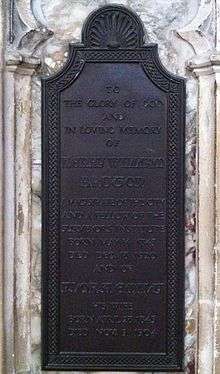Henry Bruton
Henry William Bruton (14 May 1843[1] - 18 December 1920) was a Gloucester businessman who was a key figure in the development of the city during the later part of the nineteenth century and the early twentieth century. He was born in Newent, Gloucestershire, on 14 May 1843, the son of Henry Bruton Snr.

Professional life
In 1862, Bruton's father moved to Gloucester and formed the estate agents and auctioneers Bruton, Knowles & Co. in partnership with William Knowles.[2] Henry Jr. joined the firm in 1864 and became a partner in 1870. He was largely responsible for the development of the weekly Gloucester livestock market from 1871 but he was also involved in the sales of Chepstow Castle, Tintern Abbey and Cowley Manor. He was a director of the Gloucester Gas Light Company.[1]
Other activities
Bruton held numerous public and voluntary offices. He was a Justice of the Peace, a Freemason, a City Councillor, member of the School Board and the Public Library Committee. He was a regular churchgoer and was once Churchwarden of St. Mark's in Gloucester. Bruton's interests also included William Thackeray and Charles Dickens and he was Vice President of the Dickens Fellowship. Bruton was a founding member of The Bristol and Gloucestershire Archaeological Society[3] and the Gloucester Rotary Club. He collected mezzotints.[1]
Family
Bruton's younger brother was Sir James Bruton (born 1848), who was the Member of Parliament for Gloucester from 1918 to 1923.[4] In 1871, Bruton married Flora Emily Tew Smith and they had six sons and six daughters. One daughter died in 1894 and a son, Basil, was killed in Italy during the First World War whilst serving with the Gloucestershire Regiment.[5] Flora died in 1904. Bruton was buried with her at Matson.[1]
Legacy
The firm founded by Bruton's father, and which he successfully expanded, continues in business as Bruton Knowles Property Consultants and Bruton Way in Gloucester marks the family name.
References
- "Respect to Henry, the man behind livestock market." by Kevin George in Weekend Citizen, 18 June 2011, p. 17.
- 150 years of Estates Gazette features S&A. Estates Gazette, 7 August 2008. Retrieved 21 June 2011.
- "Proceedings at the Annual Summer Meeting at Gloucester, July, 1921." in Transactions, Bristol and Gloucestershire Archaeological Society, Vol. 43, p. 2, 1921. Retrieved 21 June 2011.
- "Members of Parliament for Gloucestershire and Bristol, 1900-29: Part I. Gloucestershire" by Sir Francis Hyett in Transactions, Bristol and Gloucestershire Archaeological Society, Vol. 51, pp. 344-345, 1929. Retrieved 17 May 2016.
- Gloucestershire Regiment Officers Died 1918. http://glosters.tripod.com Retrieved 21 June 2011.